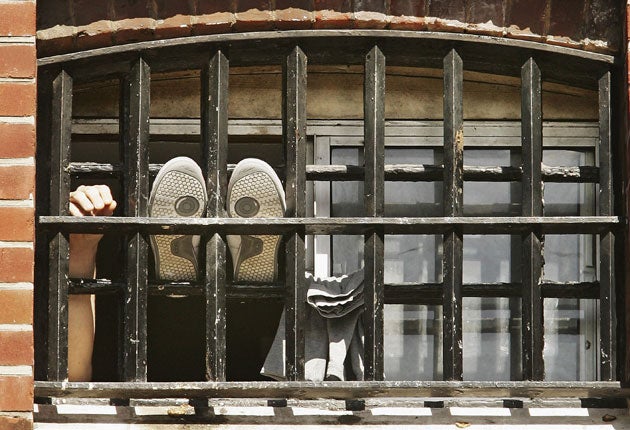Sentence review to slash numbers of women in jail
Ministers set for change amid warnings that females are severely affected by incarceration

Your support helps us to tell the story
From reproductive rights to climate change to Big Tech, The Independent is on the ground when the story is developing. Whether it's investigating the financials of Elon Musk's pro-Trump PAC or producing our latest documentary, 'The A Word', which shines a light on the American women fighting for reproductive rights, we know how important it is to parse out the facts from the messaging.
At such a critical moment in US history, we need reporters on the ground. Your donation allows us to keep sending journalists to speak to both sides of the story.
The Independent is trusted by Americans across the entire political spectrum. And unlike many other quality news outlets, we choose not to lock Americans out of our reporting and analysis with paywalls. We believe quality journalism should be available to everyone, paid for by those who can afford it.
Your support makes all the difference.Ministers plan to slash the number of women sent to prison amid complaints that women behind bars are exposed to increased risks of mental illness, self-harm and even suicide.
The Government plans to use the forthcoming sentencing review to reverse the rising numbers of women jailed – often on remand or for "minor" offences such as shoplifting.
Women make up 5 per cent of the overall prison population in England and Wales – just over 4,000 out of more than 85,000 inmates. However, the number has risen by a third in only a decade, and campaigners claim that the impact of sending a woman, rather than a man, to prison is usually more drastic – on themselves and on dependent children left on the outside.
Official figures show that 70 per cent of women in prison have two or more diagnosed mental health problems, and that female prisoners account for 52 per cent of all self-harm incidents behind bars. Fifty-five women prisoners killed themselves between 2002 and 2009.
Jackie Lowthian, director of the crime-reduction charity Nacro, said: "Going to prison generally has a much greater impact on a woman than on a man. They often face losing their children, their housing and their possessions."
Angela Prince, who served three years for attempting to smuggle drugs into the UK, had to pass her children on to other family members. "I gave one of my girls to her father and my sister took the youngest one. One of the boys went with his father but they didn't get on, so he moved into a hostel. It was very hard.... I weighed 18 stone when I went in but I developed bulimia and I went down to 10 stone."
Three years ago, the Government welcomed a review by Baroness Corston, a Labour peer, which called for more community sentences and fewer custodial sentences for more minor offences, to reduce the number of women prisoners. Despite this, the number of female prisoners continues to rise, and campaign groups now fear the new government's austerity programme may threaten community programmes across the country.
Ministry of Justice sources confirmed that the forthcoming sentencing review, which is designed to limit the overall prison population, will address the problem of the increasing number of women in jail.
Deborah Coles, co-director of Inquest, a charity focusing on deaths in custody, which advises bereaved relatives, said: "It is important to understand the context in which many women are increasingly being criminalised and imprisoned – one of poverty, addiction, racism, social exclusion, poverty, violence, family disruption, mental and physical ill health. Prisons are a repository for the mentally ill, the drug dependent, the poor and the sick for whom the social/welfare services no longer provide support."
Dominic Williamson, chief executive of the criminal justice charity Revolving Doors, said most of the women in prison were not there because they posed a serious danger to society "but because they are caught up in lives of chaos and despair".
He added: "The solution lies in ... personalised support, including secure and safe accommodation, and treatment for their substance misuse and poor mental health."
A Ministry of Justice spokesman said the department had given more than £10m to fund voluntary sector projects providing "community-based alternatives to custody" for female offenders and those at risk of offending. He went on: "The impact of a custodial sentence can have huge costs, not just to the woman herself but also society more widely."
Angela Prince: Served three years for attempted drug smuggling
"I thought prison would be bad, but when I got there it wasn't as bad as I'd thought. The people were nicer. It wasn't like in the films.
"I had four children on the outside. It's hard. I gave one of my girls to her father and my sister took the youngest one. One of the boys went with his father but they didn't get on, so he moved into a hostel. My two eldest were just getting ready to go to college.
"I became bulimic while I was in prison. I weighed 18 stone when I went in and I came out 10 stone. That was the stress of being in there. Stress was something you saw every day. The people that I hung around with were self-harmers. I felt sorry for them. I'd try to talk to people who were cutting themselves. They were the ones doing longer sentences than mine.
"There are too many in prison for petty things. I don't think they need to be in prison, not for such short sentences, anyway.
"For me, it made me into a better person. If that hadn't happened, I'd still be the same person making the same mistakes."